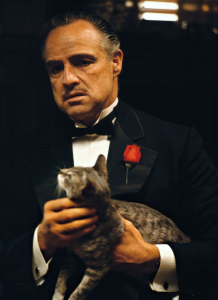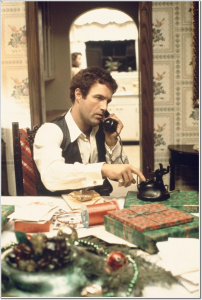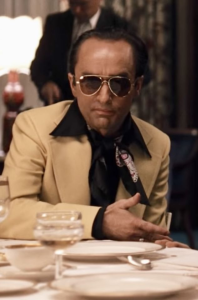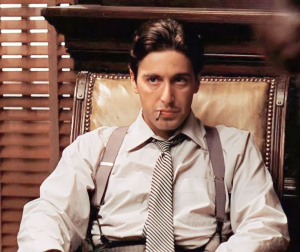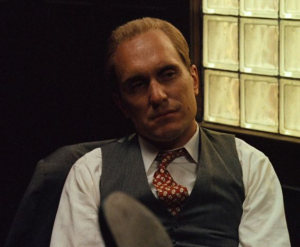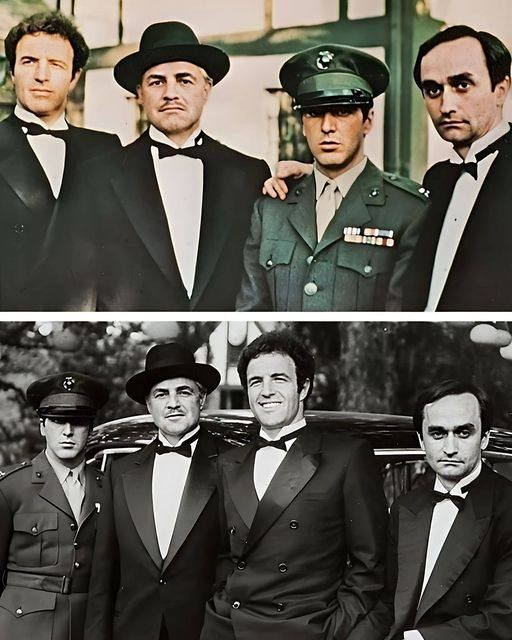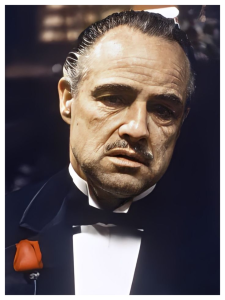
Vito Corleone is the central and most iconic figure in “The Godfather” series, portrayed by Marlon Brando. As the head of the Corleone family, Vito embodies power, wisdom, and a deep sense of loyalty to those he loves. His character, known as Don Vito Corleone or simply “The Godfather,” is both feared and respected within the criminal underworld, but he is also a family man who values the safety and prosperity of his loved ones above all else. Vito Corleone’s journey in the saga is one of rise to power, maintaining control, and eventually passing on his legacy to his children. Born into poverty in Sicily, Vito’s early life was shaped by loss and the violent murder of his family by a local mobster. This tragedy drove him to seek revenge and build an empire, eventually becoming one of the most powerful and influential crime bosses in America. Unlike many of the ruthless, aggressive mobsters around him, Vito is a shrewd and strategic leader, relying on intelligence, diplomacy, and understanding human nature rather than brute force. He is patient, calculating, and a master of negotiation, often preferring to use favors and subtle persuasion to get what he wants, making him more of a tactician than a mere enforcer. Despite his criminal dealings, Vito maintains a moral code, showing mercy to those who earn his respect and loyalty. His famous quote, “I believe in America,” reflects his desire to balance his criminal empire with the notion of personal responsibility and family unity. Vito’s power comes from his ability to form alliances, make calculated decisions, and uphold his word. This contrasts with his youngest son, Michael Corleone (Al Pacino), whose ruthless rise to power in the family’s business marks the shift from Vito’s more dignified approach to the world of organized crime to a much darker, bloodier reign. Vito’s influence is seen throughout the saga, even in The Godfather Part II (1974), where his early life is depicted in flashbacks, showcasing the foundations of the empire he built. As a father, Vito’s love for his family is unconditional, but his world of crime forces him to make difficult choices that sometimes cause harm to his children. In his later years, Vito becomes more reflective and begins to worry about the future of his family, knowing that the legacy he built will eventually fall to his sons. Vito’s ultimate death marks a turning point in the saga, symbolizing the end of an era for the Corleone family and the inevitable transition of power. His legacy lives on in Michael’s rise to power, but the stark contrast between father and son highlights the generational change and the loss of the original values that guided the family. Vito Corleone’s character is a masterful exploration of the complexities of power, loyalty, family, and the cost of maintaining a dynasty, making him one of the most iconic and influential figures in cinematic history.
The personalities of each of Vito Corleone’s sons:
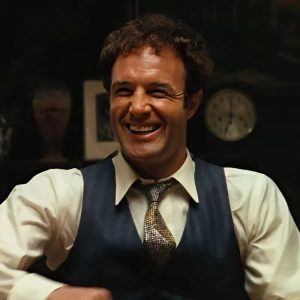
Sonny Corleone is one of the most dynamic and complex characters in “The Godfather” series, portrayed by actor James Caan. As the eldest son of Vito Corleone (Marlon Brando), Sonny is a central figure in the Corleone family, embodying both the strength and the tragic flaws that define his character. From the moment he’s introduced, Sonny’s personality is immediately evident: he is fiery, passionate, and quick to act. He is a man of action, often using violence to solve problems and protect those he loves. His temper is infamous, and unlike his father, he doesn’t have the calm, calculating nature that Vito Corleone is known for. Sonny’s character reflects the younger, more impulsive side of the mafia world—he is driven by emotion and often makes decisions without fully considering the consequences. This is especially clear after the attempted assassination of Vito Corleone, when Sonny, filled with rage, rushes to take revenge, starting a bloody war between the families. His impulsiveness and lack of strategic thinking lead to tension with his younger brother, Michael Corleone (Al Pacino), who is more measured and cautious in his approach to the family business. Sonny’s volatile behavior ultimately leads to his tragic end. In a violent ambush, he is killed while trying to rescue his sister’s husband, illustrating how his rashness and lack of foresight ultimately seal his fate. Despite his flaws, Sonny’s loyalty to his family is undeniable, and his desire to protect them at all costs highlights his deep sense of duty. However, his downfall serves as a cautionary tale about the dangers of unchecked emotion and impulsiveness in a world where power, loyalty, and family are constantly in jeopardy. Sonny’s death is a pivotal moment in “The Godfather,” marking the transition of power from him to his younger brother, Michael, who becomes more involved in the family business and eventually takes over the Corleone legacy. Sonny Corleone’s life and death encapsulate the tragic nature of the mafia world: loyalty, love, and ambition are always at odds with the violence and treachery that define it.
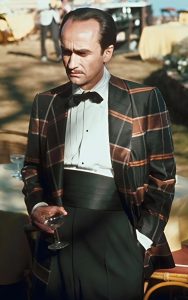
Fredo Corleone is one of the most tragic and misunderstood characters in “The Godfather” series, portrayed by actor John Marley. As the middle son of Vito Corleone (Marlon Brando), Fredo stands in stark contrast to his more dominant brothers, Sonny and Michael, which places him in a complex and often painful position within the family. Unlike Sonny’s fiery temper and Michael’s cool-headed intelligence, Fredo is portrayed as weak, insecure, and easily manipulated. His lack of the leadership qualities that make his brothers successful creates a deep sense of inadequacy in him, leading to his struggles for validation and acceptance. Fredo’s character is marked by a consistent desire for approval from his father, but he feels constantly overshadowed by the more capable Sonny and Michael. This sense of inferiority becomes a driving force in Fredo’s actions throughout the saga. His naivety and lack of self-confidence lead him to make a number of poor decisions, including betraying his family. In “The Godfather Part II” (1974), Fredo’s deep insecurities make him vulnerable to outside influences, and he ultimately betrays Michael, aligning himself with those who seek to destroy the Corleone family. This betrayal, though driven by a desire to feel important and loved, becomes a heartbreaking turning point in his relationship with his brother Michael, and it ultimately leads to Fredo’s tragic end. Despite his flaws and mistakes, Fredo is not portrayed as evil—he genuinely loves his family and wants to be part of the Corleone legacy, but his inability to live up to the expectations placed on him leads to tragic consequences. His death at Michael’s hands is one of the most emotional moments in the series, highlighting the devastating impact of betrayal and the unyielding nature of family loyalty. Fredo’s character is a poignant exploration of the consequences of insecurity, jealousy, and the struggle for identity within a powerful family dynamic. His story serves as a reminder that even those who love and wish to serve their family can be undone by their own weaknesses and desires for recognition.
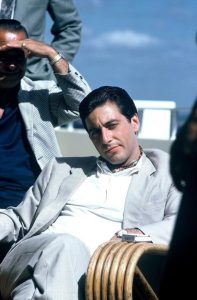
Michael Corleone is the most complex and evolved character in “The Godfather” series, portrayed by Al Pacino. As the youngest son of Vito Corleone (Marlon Brando), Michael’s journey from an innocent outsider to a ruthless Mafia boss represents the heart of the Godfather saga. Initially, Michael is portrayed as a character who wants nothing to do with the family business. He is intelligent, educated, and morally upright, choosing to distance himself from the violent world of organized crime that his father and brothers inhabit. He is a decorated war hero and initially plans a future that is separate from the Mafia world, focusing on his studies and relationships. However, circumstances push Michael into the underworld, beginning with the attempt on his father’s life. The event shakes Michael deeply, and as the situation grows more dangerous, Michael’s loyalty to his family pulls him into the mafia world despite his earlier resistance. In “The Godfather Part II” (1974), Michael’s character undergoes a profound transformation. He becomes increasingly involved in the family business, eventually taking control of the Corleone family after the death of his father. However, as Michael rises to power, his moral compass begins to erode, and he becomes more ruthless and calculating, willing to make any sacrifice to secure the family’s dominance and protect his loved ones. Michael’s personality shifts from a naive, idealistic man to a cold, strategic figure, demonstrating his ability to make difficult, sometimes immoral decisions in the name of family loyalty. His transformation is both tragic and inevitable, as the very values he once stood against slowly consume him. Throughout the series, Michael’s personal life is marked by tragedy, loss, and betrayal. His relationship with his wife, Kay Adams (Diane Keaton), deteriorates as Michael becomes more immersed in the mafia world, and his decisions lead to the alienation of his family. By the end of “The Godfather Part III” (1990), Michael is a broken man, burdened by the weight of his past actions. His quest for redemption and attempts to extricate the family from the criminal empire are futile, as his past decisions continue to haunt him. Michael’s journey is one of moral decay, where his initial desire to protect his family ends up isolating him from everything he loved. Michael Corleone is a tragic figure—once the hopeful heir to a family legacy, he ultimately becomes a man who loses everything in his pursuit of power, dominance, and control. His story serves as a meditation on the corrupting influence of power and the painful cost of loyalty.

Tom Hagen is one of the most vital and intelligent characters in “The Godfather” series, portrayed by Robert Duvall. Though not a biological son of Vito Corleone (Marlon Brando), Tom is considered a member of the Corleone family, having been adopted and raised alongside Vito’s children. Tom serves as the Corleone family’s consigliere, the trusted advisor and strategist, and is a figure of reason amidst the chaos of the mafia world. His character is unique in that, unlike the rest of the Corleone men, Tom is not directly involved in the family’s criminal activities, but instead provides legal and strategic counsel. Tom is incredibly intelligent, calm under pressure, and highly pragmatic—qualities that make him an invaluable asset to the family. He acts as a mediator and adviser, offering guidance in moments of conflict or when difficult decisions need to be made. Despite his role as a family member, Tom often finds himself at odds with Sonny Corleone (James Caan) and Michael Corleone (Al Pacino), particularly in situations where violence is required. While Tom is not as ruthless as the others, his loyalty to the Corleones is unwavering, and he is willing to do whatever it takes to protect the family, even if it means making difficult or morally questionable decisions. Throughout the series, Tom serves as a voice of reason, often trying to steer the Corleones away from rash actions and encouraging diplomatic solutions, though he is also capable of decisive action when needed. His relationship with Vito is one of deep mutual respect, as Vito sees him as a son, entrusting him with critical decisions and matters concerning the family business. Michael also relies on Tom’s counsel, but as Michael rises to power, there is a growing tension between the two, as Tom’s more conciliatory approach sometimes conflicts with Michael’s increasing ruthlessness. Despite Tom’s dedication to the Corleone family, his loyalty is tested, especially when Michael distances himself from traditional ways of running the family business. In “The Godfather Part II” (1974), Tom is essentially sidelined and even humiliated by Michael, which highlights the shift in the Corleone family’s dynamics. Though he is not a traditional mafioso, Tom’s intelligence, loyalty, and strategic mind make him one of the most important and respected characters in the Godfather saga. His journey is a testament to the idea that loyalty to family does not always come with power or recognition, but his presence is always felt in the decisions of the Corleone family. Ultimately, Tom remains a symbol of reason and stability in a world that constantly battles chaos and violence.
